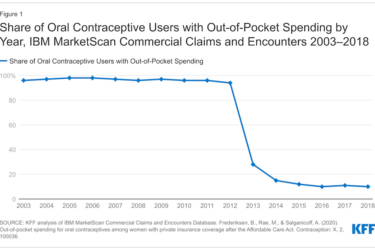
Will fretting over King v. Burwell be remembered in the same breath as worries over Y2K?
Or will the calamity of 8 million people losing health insurance come true if the plaintiffs win their case at the U.S. Supreme Court? A ruling is expected in June.
With Alliance for Health Policy’s Marilyn Serafini acting as moderator, the Chicago chapter of AHCJ gathered on May 13 for a panel discussion on “The outlook for health insurance subsidies.”
AHCJ member and Forbes contributor Bruce Japsen said his bet is on people keeping their subsidies, one way or another. “I don’t think they’re going to take the subsidies away,” he said. “We don’t take away entitlements in this country.”
Japsen said he’s been listening to health insurers’ earnings calls and hasn’t heard any concern from Wall Street analysts. “Either they’re so confident the subsidies aren’t going to go away or they don’t think it’s going to be that big a deal,” Japsen said.
Stephani Becker, a senior policy specialist at the Sargent Shriver National Center on Poverty Law, described the “death spiral” scenario. The short version? People lose subsidies. Healthy people drop coverage. Insurance rates spike. More people lose insurance.
The King plaintiffs argue that insurance subsidies under the Affordable Care Act should not be available in the 34 states, including Illinois, that don’t operate their own insurance exchanges.
If the plaintiffs prevail, governors could find themselves caught between Obamacare’s political foes and state constituents who want their subsidies, said Dan Yunker, chief executive officer of Land of Lincoln Health, a nonprofit insurance cooperative.
There’s been little to no dialogue between insurers and Illinois Gov. Bruce Rauner, a Republican venture capitalist, about a contingency plan in the event of a plaintiff win, Yunker said.
The Rauner administration was invited to send a representative to the AHCJ panel discussion, but declined.
Yunker suggested thinking about the health care overhaul as an innovative new business. “Could you imagine if this were a start-up company and you could buy stock in 8 million customers its second year?” he said. “We would all be investing in this company as fast as we possibly could. This is a remarkable story.”
The Alliance for Health Policy co-sponsored the event with support from the Robert Wood Johnson Foundation, part of a continuing series of briefings for AHCJ local chapters. The conversation happened at Columbia College’s Journalism Department in Chicago.
Related
- Reporters offer state, local story ideas for covering ACA #ahcj15
- Conference panel generates ACA resources, story ideas
- HuffPost dives into public records on King v. Burwell
- Understanding, explaining primary issues of King v. Burwell
- SCOTUS: Some things to note as we wait for a decision
- Experts weigh in on covering the SCOTUS challenge
- State waivers and the next Supreme Court ACA challenge








